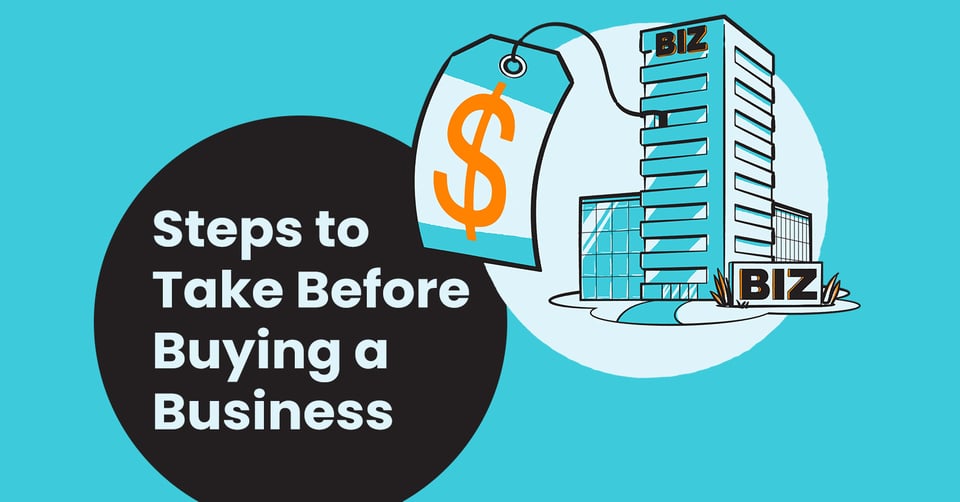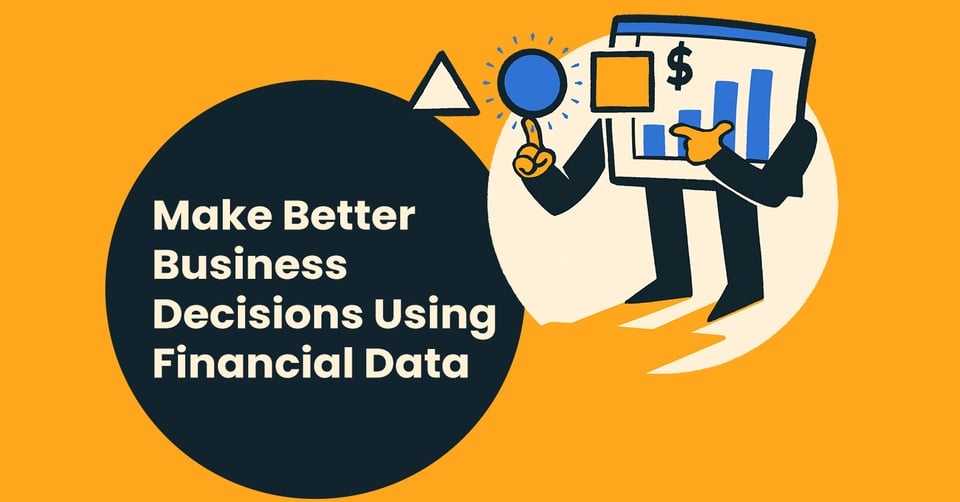
Businesses acquired in an economic downturn outperform those purchased during “good times” by more than 9%, on average. And we are certainly in a downturn.
Source: Boston Consulting Group
Does that mean you should hire a broker and start shopping? Not so fast. While it’s true that this may be a great year to consider buying a business, you’ll first need to know what’s involved.
Things to do before buying a business
There’s a ton of information out there about buying a business. But much of it skips the most important part: an analysis of your own capacity to buy and run a newly acquired company.
Calculate your own value (net worth) and cash flow
Before buying a business, get a handle on your own capabilities and areas of possible extra risk. Take a few minutes to list the values of the following:
- • Your liquid cash: Any and all money you have immediately available.
- • All your current assets: Include all categories of tangible and intangible assets. Highlight those that would most obviously contribute to the deal’s success.
- • Your yearly sales: Make a note of whether your sales are consistent or erratic and whether they’re trending up or down.
- • Your operating cash flow margin: This can be calculated by simply adding your net income to your noncash expenses, like depreciation and amortization, and finally, by adding your year-over-year change in working capital.
Knowing your current business’s value — on its own — sets you up for success.
“I will ask a prospective buyer how much money he/she has to invest, and every time (and I mean every time) that prospective buyer will tell me the amount of cash they have PLUS an amount they think they can get from friends and family,” writes broker Jim Cumbee, about financial readiness. “I always hear the words ‘I have X amount but I have an investor who can go up to X million more.' But guess what? That X million more never materializes, so most people spin their wheels looking at businesses they can never afford to buy.”
You, on the other hand, now have a good idea of your own current value and the rhythm — or timing — at which your cash moves. These details will help as questions arise about your eligibility to buy a target business.
What questions, you ask? Well, you’ll need to prove your ability to pay for ancillary costs, like business valuation fees, any broker commission (typically paid by the seller, but occasionally the buyer pays a percentage around 10%-12% of the sale), and recovery costs. You’ll also need to prove your financial ability in a formal “financing analysis,” which requires the above details.
And finally, mastery of your own financial position puts sellers at ease. Remember that business sellers go into deals with many more memories and emotions tied to the transaction than buyers. Sound financial records help vet buyers and relieve their concerns.
Assess your strengths and unique challenges
Next, it’s important to decide your goals and motivations. Success means buying a business that needs exactly what you have — and vice versa.
When Disney bought Pixar, it was because Bob Iger became obsessed with the technology, talent, and culture Steve Jobs had amassed and developed. Iger wanted it. When the two joined forces, they became unstoppable.
Source: the New York Stock Exchange via Google Finance
Or maybe you see a product your sales team could easily peddle at a faster rate than the business that currently owns it. That is what happened when, from 2010 to 2013, IBM scooped up 43 different businesses and applied their sales teams to selling the newly absorbed products. Within two years of being acquired, many of those entities’ revenues had grown by 40%.
Another reason you may want to nab another company is that your business, or their business, or both, are in a state of decline. Most business owners make deals when both businesses are in the final stages of the traditional five-phase lifecycle:
Source: Investopedia
One of your goals may be to experience a quick, simple sale that doesn’t require a ton of research or haggling — one with your choice of assets, and no unwanted liabilities, included. This is entirely doable, but you must be clear on this to make it happen.
As you think through your goals for a business acquisition, comb through your own business for inefficiencies and demand gaps. Who knows — maybe buying a business can do more for your original company than you’d previously imagined.
Perform a market evaluation
Next, you’ll analyze the market and potential businesses available — all through the lens of your goals.
Learn basic Merger and Acquisition (M&A) concepts
Ready to go shopping? There are a few things to learn before hitting the online marketplaces or attending an auction.
You’ll need to read up on traditional practices, famous successes and failures, and important M&A concepts, like liquidity ratios, inside tax basis, escrow, earn-outs, synergies, and more. We recommend grabbing a book such as Kevin Tomossonie’s Crushing It as a Corporate Buyer in the Middle Market: The Corporate Buyer's Guide to Successful M&A Deals. Get a free trial subscription to an M&A-specific business news site, like Crunchbase or the M&A Journal. Read all you can about both successful and foiled deals in your industry.
Zero in on undervalued industries
The market — not a target’s “brand perception,” profits, forecasts, or other metrics — will determine the value of a business. And, interestingly, the market has never supplied this many distressed entities.
Use your analytical judgment to determine a sector that you understand. Choose one that’s resilient. It must be in demand despite global health events, for example.
Enlist an expert guide to walk you through the financial deal
Richard Parker, president of the Business Buyer Resource Center, says that over 90% of small-business acquisitions fail. Blame this dismal pattern on inexperience, he says. Anyone who wants to buy a small business must have a trusted advisor to help.
Hire a virtual CFO, like the ones at Ignite Spot, to walk you through every step of the M&A process.
Understand the tax implications of buying the business you want
Let’s assume you (like most buyers) want an asset deal, which is the one structured in your favor. It requires less due diligence and includes no ugly surprises. Your virtual CFO will help you understand the benefits of this cash-free and debt-free arrangement, as well as the postacquisition tax consequences you’d face:
- • Your choice of liabilities
- • An ability to renegotiate or completely cancel unfavorable contracts
- • Your choice of assets (freedom to reject aging AR, for example)
- • The freedom from your target’s net operating loss, credit carryforwards, and other unfavorable tax attributes
- • New, increased tax deductions depending on the stepped-up basis of both the fair market value and depreciation/amortization of those new assets
- • Deductions on amortized goodwill
- • Your unemployment rates will stay the same, no matter who among the new talent force you choose to keep or dismiss
Your new income tax rate depends on whether you operate your newly acquired entity as a C-corp or, basically, any of the other legal structures. Your virtual CFO will explain whether your new business pays its own “income tax” or the cost is passed through to you as an individual to pay as a personal income tax.
Vet potential acquisitions
The first step in buying a business is to sign confidentiality agreements prior to performing the traditional due diligence. Once you access the financial statements of potential targets, your virtual CFO will help you rule out the many “creative” ways these reports can represent misinformation.
Then, they’ll help you determine the target company’s gross profits and rate of return per product or service, assess their accounts receivable (+aging), analyze their inventory and its value, and appraise their current properties and other fixed assets (equipment).
Next, they’ll help you look at the value of current and future customers. They’ll also examine past forecasts and compare them against actuals (projection vs. performance). They’ll compare that against current predictions to see how realistic the seller’s predictions have been before.
They’ll look through all your target’s tax records from previous years and ask about methodologies and strategies (the “why” of major decisions). They’ll also help you understand local and federal tax implications and potential deal-specific strategies.
Then, they’ll analyze a target’s current debts and their details and clauses. They’ll also learn all they can about a target’s investor agreements to see who’s involved and at what level.
During the process, your virtual CFO also considers all contracts, legal actions, patent and trademark filings’ status that apply to your target. They’ll be a second set of eyes when drafting and reviewing contracts, ensuring the deal’s financial viability.
Help with nuanced communications
Frustratingly, your choice — or timing — of words can have a financial impact on the potential deal. A financial advisor can suggest the best ways to communicate during:
- • Introductions: They’ll help you get acquainted with a target’s owner and floating overtures in a non-threatening way.
- • Bids: Your written offer must have all the right contingencies (and no more) to be taken seriously.
- • Pitching the board: If your current business is incorporated, you’ll need to involve your board of directors, even if that’s just your cofounder or spouse.
- • Negotiations: Your virtual CFO will also help guide the expected back-and-forth.
- • Telling the public: When, how, and where you tell your vendors and customers about the deal can impact your company financially.
Navigate the transition
Your virtual CFO won’t leave you hanging as soon as the ink is dry on your paperwork. They’ll steer you through your post-acquisition implementation (the industry abbreviates this phase “PMI”).
Failure to integrate under budget is one of the top reasons M&A deals fail. A financial expert will help you identify revenue strategies and new costs. They’ll assist in setting timelines and milestones for the previous owner’s involvement so that all contractual conditions are met. And they’ll give you the insights you need to restructure talent. This way, operationally, your new teams will outperform the sum of their separate parts.
Put an expert in your corner
There are two competing forces you must contend with when thinking about buying a business. First, you must recognize the fact that, as we learned above, most small-business acquisitions fail.
But, second, you must counter that gloom with the fact that this year, on average, small-business acquisitions are performing better than ever. New data from BizBuySell shows that both revenue and cash flow of small businesses bought in late 2020 are outperforming historical benchmarks in both areas.
Source: BizBuySell Insight Report
The key to a successful business purchase is a combination of boldness and caution. How is that possible? With the help of a financial expert. A virtual CFO gives you the data and actionable advice you need to make your 2021 business acquisition successful. Call us today for a free consultation and to get the conversation started.












.png)




